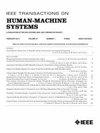A Multiobjective Discrete Harmony Search Optimizer for Disassembly Line Balancing Problems Considering Human Factors
IF 4.4
3区 计算机科学
Q2 COMPUTER SCIENCE, ARTIFICIAL INTELLIGENCE
引用次数: 0
Abstract
Ecological environment and natural resource issues are becoming more and more prominent, which promotes the recycling of waste products for green economy. Disassembly plays a key role in the remanufacturing and reuse of waste products. However, with the rapid development of production automation, designers tend to ignore the fact that manual operation is more flexible. It is of great importance to consider human factors in a disassembly process. This work considers two human disassembly postures, namely standing and sitting. The multiobjective disassembly line balancing problem considering human posture changes is studied. A mathematical model with the objective functions of maximizing profit, minimizing the number of posture changes at a workstation, and minimizing the difference of maximum posture changes between any two workstations is established. The model is solved through a newly proposed Pareto-based discrete harmony search algorithm. Three neighborhood structures are designed to enlarge the search space for better solutions. Furthermore, an elite reserve strategy is used to improve the global optimization ability of the proposed algorithm. Finally, the proposed model and algorithm are applied to cases of different scales of complexities, and the effectiveness of the proposed model and algorithm is verified in comparison with four competitive algorithms.考虑人为因素的拆解线平衡问题多目标离散和谐搜索优化算法
生态环境和自然资源问题日益突出,促进了废旧产品的回收利用,实现绿色经济。拆卸在废品再制造和再利用中起着关键作用。然而,随着生产自动化的快速发展,设计人员往往忽略了人工操作更加灵活的事实。在拆卸过程中考虑人为因素是非常重要的。这个作品考虑了两种人体拆卸姿势,即站立和坐姿。研究了考虑人体姿态变化的多目标拆解线平衡问题。建立了以利润最大化、工位姿态变化次数最少、任意两个工位之间最大姿态变化差最小为目标函数的数学模型。该模型通过一种基于pareto的离散和谐搜索算法求解。设计了三种邻域结构来扩大搜索空间以获得更好的解。此外,采用精英储备策略提高了算法的全局寻优能力。最后,将所提出的模型和算法应用于不同规模的复杂情况,并与四种竞争算法进行了对比,验证了所提出模型和算法的有效性。
本文章由计算机程序翻译,如有差异,请以英文原文为准。
求助全文
约1分钟内获得全文
求助全文
来源期刊

IEEE Transactions on Human-Machine Systems
COMPUTER SCIENCE, ARTIFICIAL INTELLIGENCE-COMPUTER SCIENCE, CYBERNETICS
CiteScore
7.10
自引率
11.10%
发文量
136
期刊介绍:
The scope of the IEEE Transactions on Human-Machine Systems includes the fields of human machine systems. It covers human systems and human organizational interactions including cognitive ergonomics, system test and evaluation, and human information processing concerns in systems and organizations.
 求助内容:
求助内容: 应助结果提醒方式:
应助结果提醒方式:


